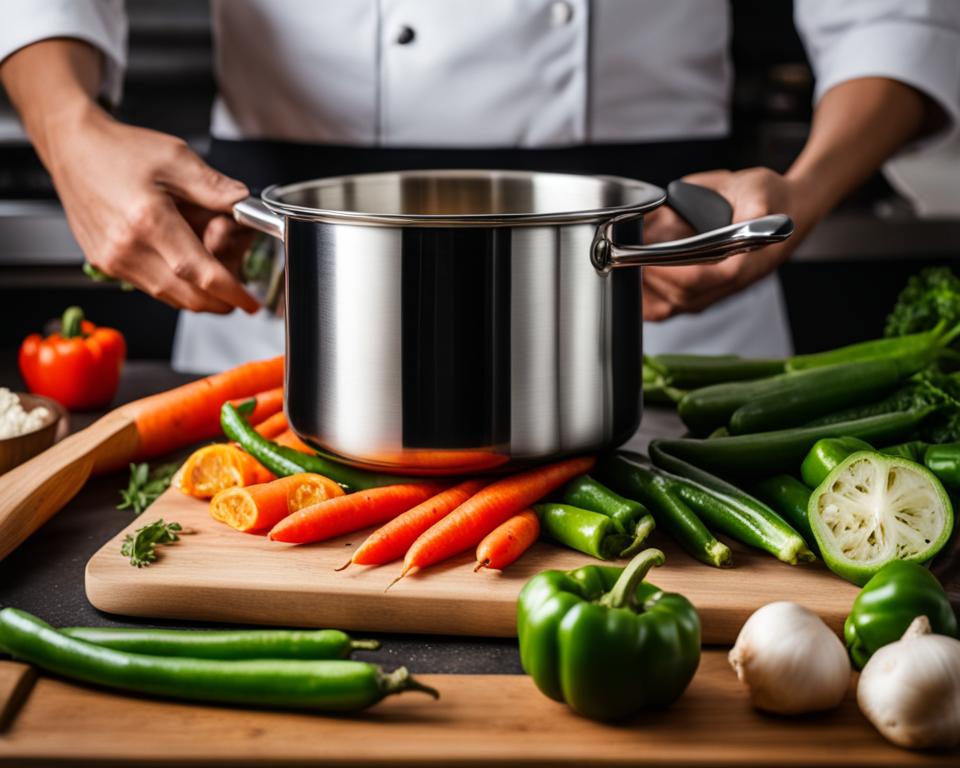What chemical can be used to clean stainless steel?
Stainless steel is a type of steel that is corrosion-resistant due to the presence of chromium. However, stainless steel can still become dirty and tarnished over time. There are a number of chemicals that can be used to clean stainless steel, including:
- Vinegar
- Lemon juice
- Baking soda
- Hydrogen peroxide
- Dish soap
Each of these chemicals has its own advantages and disadvantages. For example, vinegar is a natural acid that can dissolve rust and other stains, but it can also leave a vinegary smell behind. Lemon juice is also a natural acid, but it is less likely to leave a lingering smell. Baking soda is a mild abrasive that can help to remove dirt and grime, but it can also scratch the surface of stainless steel if used too vigorously. Hydrogen peroxide is a powerful oxidizer that can kill bacteria and remove stains, but it can also be harmful if ingested. Dish soap is a mild detergent that can help to remove dirt and grime, but it is not as effective at removing rust and other stains.
The best chemical to use for cleaning stainless steel will depend on the type of stain that you are trying to remove. For general cleaning, a mild detergent such as dish soap is usually sufficient. For more stubborn stains, you may need to use a stronger chemical such as vinegar or lemon juice.
When using any chemical to clean stainless steel, it is important to follow the directions on the product label. Be sure to rinse the stainless steel thoroughly after cleaning to remove any residue.
Benefits of using vinegar
Vinegar is a natural cleaning agent that has many benefits for cleaning stainless steel. It is a disinfectant, so it can kill bacteria and germs. It is also a deodorizer, so it can help to remove any unpleasant smells. Vinegar is also a mild abrasive, so it can help to remove dirt and grime.
Additionally, vinegar is a relatively inexpensive cleaning agent, so it is a cost-effective way to clean stainless steel. Finally, vinegar is a safe cleaning agent, so it can be used on all types of stainless steel without damaging the surface.
Different types of vinegar
There are many different types of vinegar available on the market, each with its own unique properties. Some of the most common types of vinegar include:
- White vinegar
- Apple cider vinegar
- Red wine vinegar
- Balsamic vinegar
- Champagne vinegar
Each type of vinegar has its own unique flavor and acidity level, so it is important to choose the right type of vinegar for the job you are trying to do. For example, white vinegar is a good choice for cleaning because it is strong and acidic. Apple cider vinegar is a good choice for cooking because it has a mild flavor. Red wine vinegar is a good choice for salad dressings because it has a tangy flavor. Balsamic vinegar is a good choice for drizzling over food because it has a sweet and complex flavor. Champagne vinegar is a good choice for cocktails because it has a light and refreshing flavor.
How to use vinegar
To use vinegar to clean stainless steel, follow these steps:
- Pour vinegar onto a clean cloth or sponge.
- Wipe the vinegar onto the stainless steel surface.
- Rinse the surface with water.
- Dry the surface with a clean cloth.
You can also use vinegar to clean stainless steel appliances, such as refrigerators, dishwashers, and ovens. To clean an appliance, follow these steps:
- Turn off the appliance and unplug it from the power outlet.
- Pour vinegar into a spray bottle.
- Spray the vinegar onto the appliance.
- Leave the vinegar on the appliance for several minutes.
- Wipe the vinegar off the appliance with a clean cloth.
- Rinse the appliance with water.
- Dry the appliance with a clean cloth.
Vinegar is a versatile cleaning agent that can be used to clean a variety of surfaces, including stainless steel. It is a safe and effective way to clean stainless steel without damaging the surface.
V. Vinegar recipesHere are some recipes for using vinegar to clean stainless steel:
- To clean a stainless steel sink, mix equal parts vinegar and water in a spray bottle. Spray the solution on the sink and let it sit for 10 minutes. Wipe the sink clean with a damp cloth.
- To remove rust from stainless steel, mix 1 part vinegar to 2 parts water in a bowl. Soak a cloth in the solution and rub it over the rust. Let the solution sit for 10 minutes, then rinse the area clean with water.
- To clean stainless steel appliances, mix 1 part vinegar to 1 part water in a spray bottle. Spray the solution on the appliances and let it sit for 10 minutes. Wipe the appliances clean with a damp cloth.
- To remove fingerprints from stainless steel, mix 1 part vinegar to 2 parts water in a spray bottle. Spray the solution on the fingerprints and wipe them away with a dry cloth.
VI. Vinegar safety tips
Here are some safety tips to keep in mind when using vinegar:
- Always wear gloves when handling vinegar.
- Avoid contact with eyes and skin.
- Do not mix vinegar with other chemicals, as this could produce harmful fumes.
- Store vinegar in a cool, dry place.
FAQs about vinegar
1. Can I use vinegar to clean stainless steel?
Yes, vinegar is a safe and effective way to clean stainless steel. It can remove dirt, grime, and grease without damaging the surface.
2. How do I use vinegar to clean stainless steel?
To clean stainless steel with vinegar, mix equal parts vinegar and water in a spray bottle. Spray the solution onto the surface of the stainless steel and let it sit for a few minutes. Then, wipe the surface clean with a soft cloth.
3. What are the benefits of using vinegar to clean stainless steel?
Vinegar is a natural disinfectant, so it can help to kill bacteria and germs on stainless steel surfaces. It is also a mild acid, which can help to remove tough stains and build-up.
4. Are there any risks associated with using vinegar to clean stainless steel?
Vinegar is a corrosive acid, so it can damage some surfaces if it is not used properly. It is important to avoid using vinegar on polished or anodized stainless steel, as it can dull the finish.
5. What are some other ways to clean stainless steel?
In addition to vinegar, there are a number of other ways to clean stainless steel. Some common methods include using baking soda, dish soap, and a soft cloth.
6. How often should I clean stainless steel?
The frequency with which you clean stainless steel depends on how often it is used. If you use stainless steel frequently, you should clean it at least once a week. If you do not use stainless steel very often, you can clean it less often.
7. What are some tips for cleaning stainless steel?
Here are a few tips for cleaning stainless steel:
* Use a soft cloth or sponge to avoid scratching the surface.
* Rinse the surface thoroughly with water after cleaning to remove any residue.
* Dry the surface with a soft cloth to prevent water spots.
8. What are some common mistakes people make when cleaning stainless steel?
Some common mistakes people make when cleaning stainless steel include:
* Using harsh chemicals or abrasive cleaners.
* Using too much pressure when cleaning.
* Not rinsing the surface thoroughly after cleaning.
9. What is the best way to protect stainless steel?
The best way to protect stainless steel is to keep it clean and dry. You can also use a sealant or polish to help protect the surface from scratches and stains.
10. Where can I find more information about cleaning stainless steel?
You can find more information about cleaning stainless steel on the following websites:
* [The Spruce Crafts](https://www.thesprucecrafts.com/clean-stainless-steel-3016060)
* [Good Housekeeping](https://www.goodhousekeeping.com/home-cleaning/tips/a26362287/how-to-clean-stainless-steel/)
* [HGTV](https://www.hgtv.com/design/make-and-remodel/home-improvement/how-to-clean-stainless-steel-3291949)Conclusion
Conclusion
In this article, we have discussed the different ways to clean stainless steel. We have also provided tips on how to prevent stainless steel from becoming dirty in the first place. By following these tips, you can keep your stainless steel looking its best for years to come.
Call to action
If you are looking for a natural and effective way to clean stainless steel, vinegar is a great option. It is a versatile cleaner that can be used on a variety of surfaces, and it is also safe for use on stainless steel. To clean stainless steel with vinegar, simply mix equal parts vinegar and water in a spray bottle. Spray the solution onto the surface of the stainless steel and let it sit for a few minutes. Then, wipe the surface clean with a soft cloth.
Vinegar is a great way to clean stainless steel because it is acidic, which helps to break down dirt and grime. It is also a natural disinfectant, which helps to kill bacteria. Additionally, vinegar is inexpensive and easy to find, making it a great option for cleaning stainless steel on a budget.
If you are looking for a more detailed guide on how to clean stainless steel with vinegar, be sure to check out our blog post on the topic.


